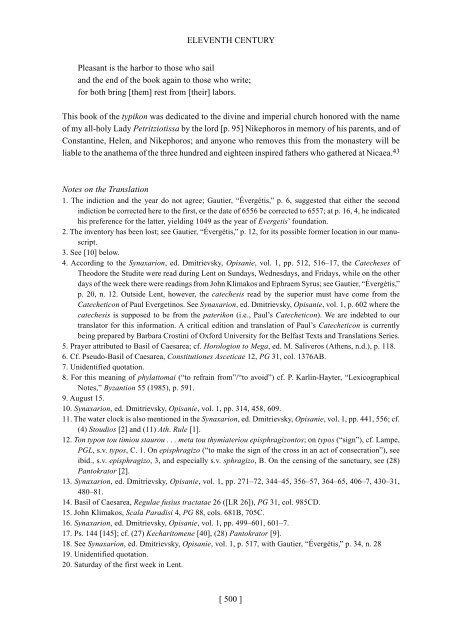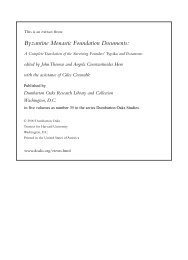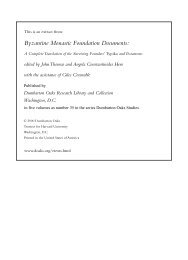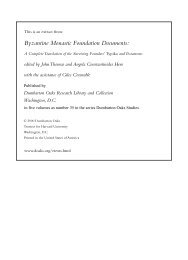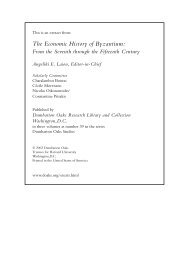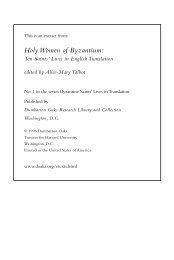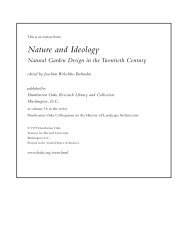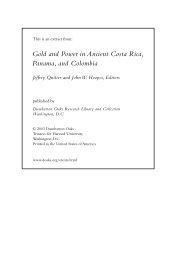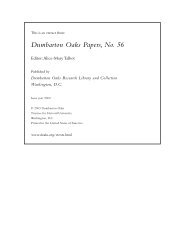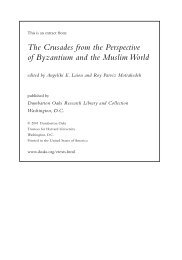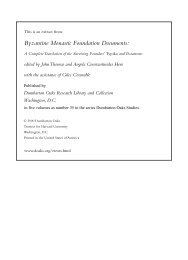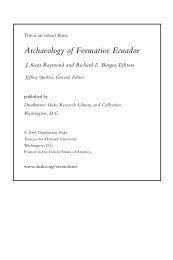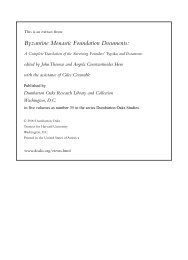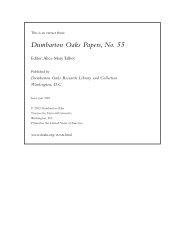22. Evergetis - Dumbarton Oaks
22. Evergetis - Dumbarton Oaks
22. Evergetis - Dumbarton Oaks
You also want an ePaper? Increase the reach of your titles
YUMPU automatically turns print PDFs into web optimized ePapers that Google loves.
ELEVENTH CENTURY<br />
Pleasant is the harbor to those who sail<br />
and the end of the book again to those who write;<br />
for both bring [them] rest from [their] labors.<br />
This book of the typikon was dedicated to the divine and imperial church honored with the name<br />
of my all-holy Lady Petritziotissa by the lord [p. 95] Nikephoros in memory of his parents, and of<br />
Constantine, Helen, and Nikephoros; and anyone who removes this from the monastery will be<br />
liable to the anathema of the three hundred and eighteen inspired fathers who gathered at Nicaea. 43<br />
Notes on the Translation<br />
1. The indiction and the year do not agree; Gautier, “Évergétis,” p. 6, suggested that either the second<br />
indiction be corrected here to the first, or the date of 6556 be corrected to 6557; at p. 16, 4, he indicated<br />
his preference for the latter, yielding 1049 as the year of <strong>Evergetis</strong>’ foundation.<br />
2. The inventory has been lost; see Gautier, “Évergétis,” p. 12, for its possible former location in our manuscript.<br />
3. See [10] below.<br />
4. According to the Synaxarion, ed. Dmitrievsky, Opisanie, vol. 1, pp. 512, 516–17, the Catecheses of<br />
Theodore the Studite were read during Lent on Sundays, Wednesdays, and Fridays, while on the other<br />
days of the week there were readings from John Klimakos and Ephraem Syrus; see Gautier, “Évergétis,”<br />
p. 20, n. 12. Outside Lent, however, the catechesis read by the superior must have come from the<br />
Catecheticon of Paul Evergetinos. See Synaxarion, ed. Dmitrievsky, Opisanie, vol. 1, p. 602 where the<br />
catechesis is supposed to be from the paterikon (i.e., Paul’s Catecheticon). We are indebted to our<br />
translator for this information. A critical edition and translation of Paul’s Catecheticon is currently<br />
being prepared by Barbara Crostini of Oxford University for the Belfast Texts and Translations Series.<br />
5. Prayer attributed to Basil of Caesarea; cf. Horologion to Mega, ed. M. Saliveros (Athens, n.d.), p. 118.<br />
6. Cf. Pseudo-Basil of Caesarea, Constitutiones Asceticae 12, PG 31, col. 1376AB.<br />
7. Unidentified quotation.<br />
8. For this meaning of phylattomai (“to refrain from”/“to avoid”) cf. P. Karlin-Hayter, “Lexicographical<br />
Notes,” Byzantion 55 (1985), p. 591.<br />
9. August 15.<br />
10. Synaxarion, ed. Dmitrievsky, Opisanie, vol. 1, pp. 314, 458, 609.<br />
11. The water clock is also mentioned in the Synaxarion, ed. Dmitrievsky, Opisanie, vol. 1, pp. 441, 556; cf.<br />
(4) Stoudios [2] and (11) Ath. Rule [1].<br />
12. Ton typon tou timiou staurou . . . meta tou thymiateriou episphragizontos; on typos (“sign”), cf. Lampe,<br />
PGL, s.v. typos, C. 1. On episphragizo (“to make the sign of the cross in an act of consecration”), see<br />
ibid., s.v. episphragizo, 3, and especially s.v. sphragizo, B. On the censing of the sanctuary, see (28)<br />
Pantokrator [2].<br />
13. Synaxarion, ed. Dmitrievsky, Opisanie, vol. 1, pp. 271–72, 344–45, 356–57, 364–65, 406–7, 430–31,<br />
480–81.<br />
14. Basil of Caesarea, Regulae fusius tractatae 26 ([LR 26]), PG 31, col. 985CD.<br />
15. John Klimakos, Scala Paradisi 4, PG 88, cols. 681B, 705C.<br />
16. Synaxarion, ed. Dmitrievsky, Opisanie, vol. 1, pp. 499–601, 601–7.<br />
17. Ps. 144 [145]; cf. (27) Kecharitomene [40], (28) Pantokrator [9].<br />
18. See Synaxarion, ed. Dmitrievsky, Opisanie, vol. 1, p. 517, with Gautier, “Évergétis,” p. 34, n. 28<br />
19. Unidentified quotation.<br />
20. Saturday of the first week in Lent.<br />
[ 500 ]


